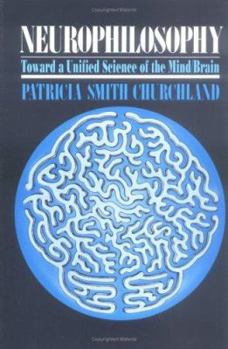Neurophilosophy: Toward a Unified Science of the Mind-Brain
Select Format
Select Condition 
Book Overview
Five chapters in the book's first part, "Some Elementary Neuroscience," sketch the history of the science of nervous systems and provide a general introduction to neurophysiology, neuroanatomy, and neuropsychology. In the second part, "Recent Developments in the Philosophy of Science," chapters place the mind-body problem within the wider context of the philosophy of science. Drawing on recent research in this area, a general account of intertheoretic...
Format:Paperback
Language:English
ISBN:0262530856
ISBN13:9780262530859
Release Date:September 1989
Publisher:Bradford Book
Length:560 Pages
Weight:2.05 lbs.
Dimensions:1.2" x 5.5" x 9.4"
Age Range:18 years and up
Grade Range:Postsecondary and higher
Related Subjects
Behavioral Sciences Biological Sciences Biology Cognitive Cognitive Psychology Consciousness & Thought Health, Fitness & Dieting Health, Fitness & Dieting History & Philosophy Internal Medicine Medicine Philosophy Politics & Social Sciences Psychology Psychology & Counseling Science Science & Math Science & Scientists Science & TechnologyCustomer Reviews
4 ratings
Whether you dispute the premise or not...
Published by Thriftbooks.com User , 18 years ago
You will find Churchland's arguments compelling. She builds her case methodically and comprehensively. Neurophilosophy presents another dimension to a variety of phenomena. This grounding is valuable because it has you reconsider your usual way of looking at how you look at the world.
Out of date now...but motivates modern developments
Published by Thriftbooks.com User , 21 years ago
Published over 17 years ago, this book was one of the first examples of the now accelerating trend to make philosophical investigations into the mind/brain problem accountable to modern science. Pure speculation once dominated any discussion of the mind (or the brain) and therefore progress in the field by any measure was non-existent. There are of course still purely philosophical investigations into the mind/body problem, but these will no doubt decay rapidly with time as scientific investigations continue to lay to rest various "impossibility" claims philosophers have made about the physical brain. Indeed, in this century, the rise of machine intelligence will hammer the last nail in the coffin of mind/brain philosophical speculation. The author of the book is a materialist, and in this book she has given an excellent justification of her position, and expresses at all times fairness to those who disagree with her positions and conclusions. She also expresses a rare intellectual honesty about the scientific evidence supporting her claims, informing the reader at every place in the book where it is not available or weak at best. Without a doubt the author was not happy at the state of philosophy at the time the book was published, holding that it completely omitted neuroscience, and embraced in her words "a novel and sophisticated form of dualism". She explains this was ample reason for her to take the plunge into a more scientific/empirical framework. The book is an excellent example of what can result when a philosopher decides to do this. The book is divided up into three parts, with the first one emphasizing the biology of nervous systems and neuropsychology, the second part an overview of developments in the philosophy of science, and the third part discussing the ramifications of neurobiology for research in artificial intelligence. Although somewhat out of date due to the advancements in both experimental and theoretical neuroscience since then, it could still be of interest, mainly to philosophers, who are interested in applying their talent for logical thinking and organization to difficult problems in neuroscience. The transition from pure philosophical speculation to the rigors of scientific investigation may at first be difficult for the typical armchair philosopher, but their high degree of intelligence and their restless desire to get at the truth will soften it considerably. And in the decades ahead, one will witness the presence of "industrial philosophers": those who have chosen to leave the "proverbial armchair" and apply their abilities to both understand and give rise to intelligent machines.
Layed the framework.
Published by Thriftbooks.com User , 22 years ago
This book is now a bit dated, so its importance is much more historical. This book was intended to show philosophers some neurobiology and neurobiologists some philosophy. It follows from Churchlands strict scientific view of philosophy, and her at that time eliminitavist position - the belief that all folk-psychological concepts can and should be replaced by scientific concepts of neurobiology. So the book introduces neuroanatomy, function, etc... but that maeterial is somewhat dated. There is an introduction to philosophy of science. But the core argument is that philosophy of mind should use neurobiological insights in theorizing, and the belief that it will be at the end neurobiology all thet there is to it.For some reasons, this is no place to critique the books views. This was the first serious and very ambitious attempt into integrating neurosicience and philosophy of mind to tackle problems like cosnciousness, perception, action, etc.. Elimitivism is not highly regarded nowdays, and the fuzz about connectionist models is fading away. Some proposals were naive, even. But the book is still a classic in the field of cognitive neuroscience, philosophy of mind, and well, neurophilosophy.
The Epistemology of Consciousness
Published by Thriftbooks.com User , 27 years ago
Churchland's primary goal is to demonstrate that the problem of mind-brain is reducable through neuroscience. She gives a brief history of the study of the brain, basic neuroanatomy, and talks about recent developments in the philosophy of science. Tremendous job ! Very detailed, hard reading, but extremely worthwhile






